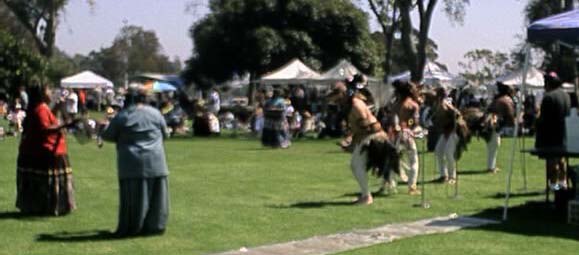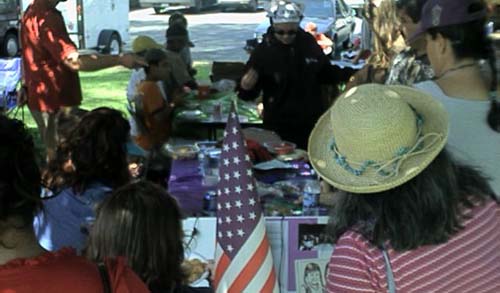Balboa Park California
Indian Day, September 2002
Native Americans present traditional
dances, music
By Roy Cook
Dancers in colorful traditional regalia, the aroma of Indian tacos. Visitors
browsed through dozens of arts and crafts booths, munched on traditional
Indian tacos or enjoyed the cool grass and shade this sunny weekend in
Balboa Park.
Those attending were treated to a wealth of traditional Indian activities,
including dancing, and story telling. The Kumeyaay Bird singers led by
Ron Christman, Running Grunion (Abel Silvas), and the ever popular, Native
Blues with Tracy Nelson, Harold Hill and the on time, on beat, drummer
brought the Party on the Rez to the park and got down to business.
 |
Of special note is the very popular, large group of singers and dancers
from the Northern California Bay area, Grindstone Dancers (Pomo and Maidu)
and the Roadrunner Dancers and the Rumsen Ohlone led by Chief Tony Cerda
and members of the Costanoan Carmel Indian Tribe. These were crowd pleasers
and very colorful in their traditional regalia and body painting. This
event offered an opportunity to examine complexities of Music form and
style not often seen out of the traditional role of song presentation.
The Tucuk Birdsong is one of the major traditional song styles sung in
this Southern California region. These songs extend over tribal and linguistic
boundaries. In point of fact these songs extend beyond the imposed international
boundary. These Bird songs have been sung before time immemorial. Their
role is multi-faceted and multi-dimensional in expression and application.
Presented at this event are two variations of the traditional Tipai songs.
The Tucuk and Naimie or Wildcat. Ron Christman, Tucuk singer, has been
listening to local tribal songs for all of his life. Ron's father sang
variations of the Kumeyaay traditional song styles. Following Ron's military
service and during his long employment as an Engineer by the California
Department of Forestry, he sought out tribal elders for instruction in
singing these traditional Bird songs. For the past thirty years Ron has
often called upon to participate in the custom and tradition of the local
Kumeyaay people. He is frequently requested to speak to non-tribal groups
and address civic and youth activities.
The Wildcat songs were led by Juan Meza Cuero. He said in an interview,
"I was born in the Protero area, of San Diego County in 1939. Alfonso
Meza, my Father, started me singing when I was seven. He taught me the
structure and presentation of my first Wildcat songs. I have been singing
this style of Tipai song all my life. There are many other styles of Tipai
song and there used to be many more singers of Wildcat and other Tipai
songs. I am very interested in doing what I can to see these Nyemii, Gato,
Wildcat songs continue to be sung. I feel it is my role to teach these
songs to the next generation of our tribal youth. In this modern world
I hope to bring a sense of pride and cultural self esteem to our children
identity.
For more on this traditional song see: /traditionalbird.html
"We are having a great turnout," said Mara Peters, IHRC board member,
"and it is all thanks to the hard work of the committee, Karen Vingualt
and Richard Bugbee and all of the other volunteers. This is a real community
effort." She added that the CALIFORNIA INDIAN DAYS Festival is not a money-making
venture but a chance for friends to get together and for non-Indians to
learn more about the Native American culture.
Traditionally this event is an acknowledgment of the State of California
proclamation; the fourth Friday of September will be recognized as American
Indian Day. This was signed into law by, then Governor Ronald Regan. For
many years it has been held on the Saturday following this date to accommodate
those who have employment obligations and those that might need the extra
time to get here from where they were living now to the event in Balboa
Park. This Balboa Park location has been the first choice from the beginning
of the event, for many historical lessons that needed the right time to
be declared.
The 1999 Jose M. Hatam Days committee, that selected this author to chair,
was the new beginning of a public awareness and education program.
For more on Hatam Days see: /hatamreview.html
The legacy of the California Tribal people is a lesson for all Americans to learn. Endure, follow your custom and tradition, learn your traditional ways, each dialect of the language is special to the local Band and region. These are the things that we must hold on to. The Creator is kind to all his creation. Things are never more than what we can endure. This is the compassion of the Creator. Our individual human character will define how we deal with the circumstances of life and those things around us. Once again, our American future, the children were there, smiling, trusting, running in the sunlight and shade, wiggling their toes in the grass. The children were laughing and rolling in play. These children are our national future, we must always think of them.
 |
Title Seven Indian Education Program demonstrated leadership at the last
organizing committee meeting and volunteered to offer a children's craft
corner with wonderful volunteers and staff instruction - for free. No
cost, all supplies, all smiles, all joy, and all stories of accomplishment
and pride in our Indian heritage, free. Organized by Vickie Gambala, IHRC
community board President, the Children's Corner with rows of tables in
the shade saw hundreds of children over the two days. They made baskets,
painted rocks, worked with clay, made dream catchers. So often interest
is voiced by other cultures regarding the local tribal people music and
art.
This is the place to be this weekend. California Indian Days Celebration
presented a jam-packed schedule of selected tribal dances regalia, songs
and words of encouragement to those in attendance.
For more on Indian Education see: /indianed/indianed.html
There was a lot more music on hand this weekend for all to enjoy. This
event is always free and open to the public. Additionally, in attendance,
were forty or more vendors. Current information, health screenings, beautiful
tribal art, impressive items to display and of course food booths for
everyone's favorite, fried bread, corn, and mutton stew. We will count
on seeing you at the next California Indian Days!
americanindiansource.com
Roy Cook (Mazopiye Wichasha) Opata/Osage, author/publisher.